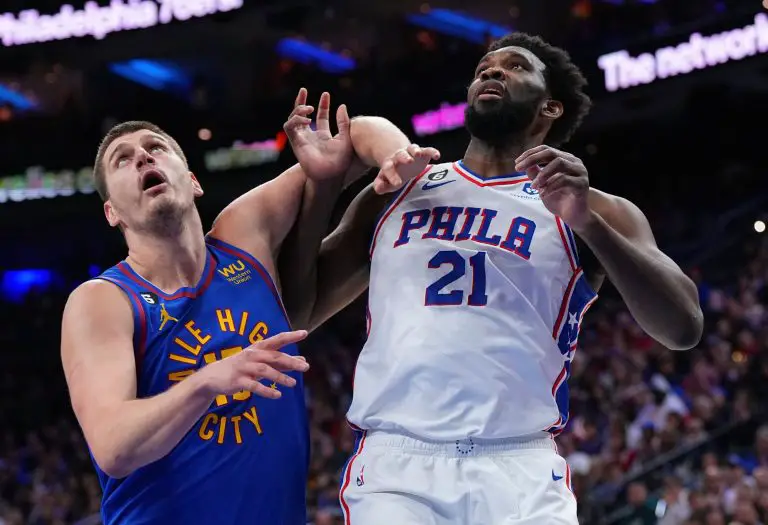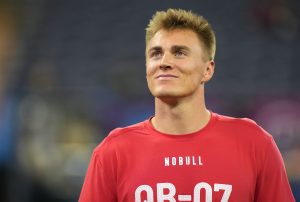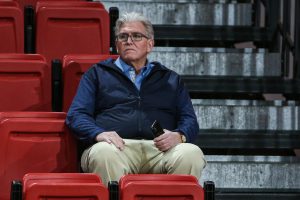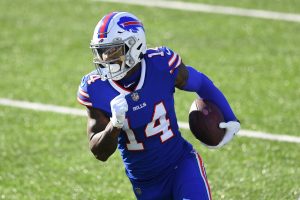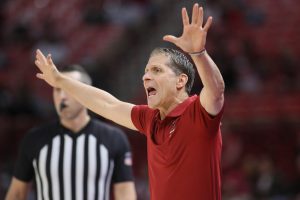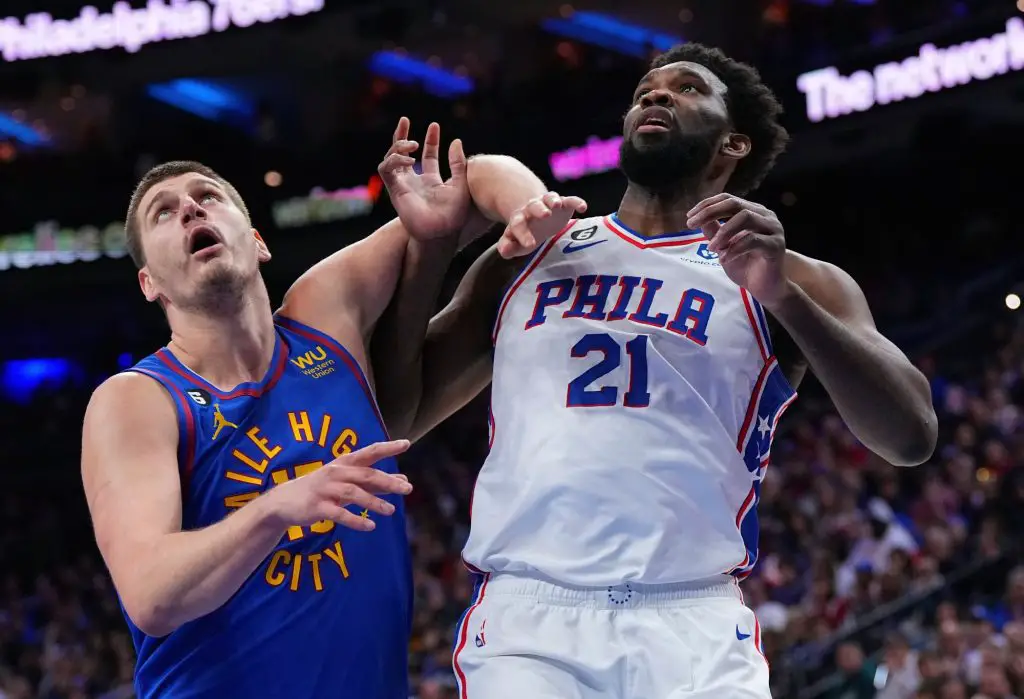
Are you as over all of the talk of voter fatigue as I am? Are you – ahem – fatigued by the talk of Nikola Jokic being robbed of a historical 3rd consecutive MVP win by some amorphous concept of the NBA voting public getting bored of writing down the same name on their ballots?
Whilst this season’s MVP debate has started to become somewhat toxic in certain instances, there can be no doubt that the race is as tight and as polarising as any in recent memory.
Is voter fatigue going to be a factor in this year’s MVP decision? Let’s discuss.
We’ll begin by asking: what is voter fatigue?
Simply put, voter fatigue is when the voting body collectively starts to tire of voting for a specific player on multiple occasions. That can, in turn, lead to voters showing favouritism (consciously or unconsciously) towards an apparently lesser candidate.
This alleged fatigue can stem from a slight statistical downturn, an ascendant player receiving their bouquets before they’re due, an especially captivating narrative (positive or negative) or it could simply be a case of boredom – a player proving too dominant for too long.
There have been numerous occasions in NBA history where a controversial MVP win is instantly tarred with the ‘voter fatigue’ brush. We’ll look into some of those later.
The NBA MVP award is meant to reflect true greatness. To that end, more than a third of all MVP’s (24 of 67) are shared by just five players. A further nod to awarding the MVP to the best player of an era is that 13 of the 15 players to win multiple MVP’s did so in back-to-back campaigns.
Does that indicate a lack of voter fatigue? Perhaps. The fact that only three men – all of them undoubtedly top 10 players of all time – have MVP three-peats may suggest otherwise.
The voting system used by the NBA for deciding its MVP each season is known as a Borda Count, a concept borrowed from standard Western political voting. I won’t go into too much detail (the ever-educational Tim Schmitz does so here, if you’re so inclined) other than to say that the Borda system is designed to eliminate an apparent unwarranted candidate from winning a vote which, in turn, means that a broadly acceptable winner should come through.
That’s not to say that everyone will always be satisfied with the MVP winner. Personal preference does, of course, comes into account. The Borda Count should, though, ensure that the winner isn’t a complete and total outlier.
The one major change in MVP voting over the years occurred at the end of the 1980 season when voting was moved from the players themselves to selected media members. We’ve seen through their All-Star votes over the years, that placing trust in the players may not always be the wisest move. The Borda Count is designed to counter those more outlandish selections.
So if the voting system itself isn’t the reason why we see the occasional MVP controversy, then what is?
There are a myriad of reasons with some, though not all, applying to multiple occurrences of controversial MVP awards.
Let’s take a look at a selection of MVP counts that have led to so much discourse over the years, with a specific focus on players gunning for their 3rd straight MVP.
1973 – Kareem Abdul-Jabbar (Milwaukee Bucks)
Winner: Dave Cowens – Boston Celtics
This might be the most egregiously incorrect MVP in NBA history.
Kareem was by quite a stretch the best and most dominant basketballer in the world in 1973.
Whilst his scoring had dropped from a league leading 34.8 points per game the year prior, Kareem still posted 30.2 points, along with 16.1 boards and (to that point a career high) five assists a game. Steals and blocks would not be recorded until the next season, but given Kareem averaged 1.4 steals and 3.5 blocks in 1974, it’s not hard to imagine his numbers being equally gaudy in 1973. Whilst advanced stats were not exactly prevalent in the early 1970’s, what was available had Kareem miles out in front of Cowens.
Perhaps the most telling factor came in Kareem being named to the All-NBA first team (voted by the media, as opposed to his fellow players), with Cowens relegated to the second team. Cowens’ own teammate in John Havlicek made the first team.
So what did Cowens, who you could argue wasn’t even the Celtics best player (nods to Hondo) have going for him? Wins, though even that race wasn’t a blowout. His Celtics won 68 games that year, to the Bucks 60.
The narrow gap in team success aside, Kareem’s slight drop in counting stats may have been the contributing factor in his failed attempt at an MVP three-peat.
Interestingly, Kareem – this time as a Los Angeles Laker – was again unlucky to lose the 1978 MVP race, this time to Bill Walton.
Walton, forever snake-bit, only played in 58 games that season, though his Blazers went 48-10 in those matches which likely played a part Kareem losing despite a far superior statistical case.
Another, more unsavory factor to consider here, is race. Kareem was and still is a fierce advocate for racial equality. Cowens and Walton are both white. Whilst the racial demographic of the league was changing in the 1970’s, the NBA was still a predominantly white league. It’s obviously impossible to gauge racial prejudice in these decisions, though it’s naïve to think that Kareem’s skin colour and social campaigning didn’t play some part in the voters’ decisions.
It’s kind of nuts to think that Kareem should have been an eight-time MVP winner. If that did come to pass, is he still considered the clear GOAT, rather than simply a part of the conversation alongside Michael Jordan and LeBron James?
1993: Michael Jordan (Chicago Bulls)
Winner: Charles Barkley (Phoenix Suns)
Jordan, pushing for a double three-peat (rings and MVP’s) came through in the ring chase, though was pipped by Sir Charles for individual honours. Should he have been, though?
Jordan put forward a very similar statistical case to his MVP winning 1992 campaign, even increasing his productivity in several key areas including scoring, three point percentage and steals. Statistically, Barkley improved across the board in his first season in the desert, though he still fell a ways behind Jordan’s production.
So how did Chuck steal the MVP? A combination of team success and narrative.
The Bulls, likely tired from back-to-back finals runs, took on the 1993 regular season with a more measured cadence, playing with the playoffs in mind. Whilst Chicago still won a commendable 57 games, enough to snare 2nd in the East, it paled in comparison to the 67 wins they had chalked up the season prior.
Barkley, an off-season acquisition from the Sixers, revitalised the stagnating Suns, leading them to a league leading 62 wins, nine more than the year before.
Jordan was perceived to have taken the regular season a little easier, despite the numbers indicating the opposite, whereas Barkley had escaped his professional hell in Philadelphia to come to lead a talented Suns team near to the summit…where they got summarily squished by an all-time series by Michael.
2011: LeBron James (Miami Heat)
Winner: Derrick Rose (Chicago Bulls)
Often seen as one of the worst miscarriages of MVP justice in NBA history, Rose becoming the youngest MVP in league history wasn’t nearly as bad as it’s remembered (It’s certainly not as bad as Rose receiving a 1st place vote in 2020). It was, though, still a travesty.
It’s practically impossible to build a statistical case for Rose beating James. LeBron led Rose in almost every counting stat and all of the advanced stats that existed at the time. Rose could point to razor-thin leads in assists (by 0.7) and three point percentage (by 0.02%).
Rather than production, Rose’s win was built almost entirely on narrative.
Whilst some may point to the Bulls 62 wins, that total was predominantly built on the back of an incredible defense that succeeded in spite of Rose. For his part, Rose did carry the Bulls offensively.
James, if you’ll remember, had just left a 60 win team himself to join what became somewhat derisively known as the Heatles.
Whilst in pure basketball terms it was completely defensible, the way James carried out The Decision was messy and poorly thought through. The backlash was swift.
Whilst many thought that the Heat would stroll to the title, the public generally wished nothing but ill upon Miami’s superteam.
It’s not exactly a stretch to imagine that the voters decided to stump for the home town lad leading his team to glory over man that had very publically and quite narcissistically dumped his own home town team.
2017: Stephen Curry (Golden State Warriors)
Winner: Russell Westbrook (Oklahoma City Thunder)
The narrative simply oozes out of this MVP race.
From Curry’s perspective, his team had just come off a record setting regular season, only to be gazumped by LeBron’s Cleveland Cavaliers in an all-time great finals series.
In response to that setback the Warriors only went and acquired Westbrook’s former running mate in Kevin Durant.
In response, Westbrook went nuclear, becoming only the 2nd player in NBA history to average a triple double for the season. It was the sheer novelty of Westbrook’s statistical feat that won him this MVP. It certainly wasn’t team success, with Westbrook’s 47 wins representing the lowest win total for an MVP since Jordan in 1988.
Curry still enjoyed a fine season, coming close to matching his 2016 averages, despite having to accommodate for Durant’s arrival. It must be said, though, that Westbrook’s main competition for this award wasn’t Curry. He finished 6th in the MVP vote for the season, perhaps reflecting a backlash against his and the Warriors finals loss the season before.
This really should have been James Harden’s MVP. He did almost everything that Westbrook did statistically, only with greater efficiency and resulting in eight more wins. If Harden had managed to grab an extra two boards a night (in other words, if Clint Capela had sacrificed himself in the same way Steven Adams did for Russ) then this award likely goes to The Beard.
**
There are a pair of prevailing themes throughout those examples: narrative and team record. Does that mean that voter fatigue doesn’t exist? Not exactly.
Whilst it patently untrue that voters simply decide to stop voting for a player after consecutive MVP’s, it could well be argued that the voting body might look for excuses to move onto the next shiny thing, rather than rewarding the production that is in front of them.
Aside from the examples cited above, Durant’s 2014 MVP win came down to a mixture of being the newly ascendant star and a superior team record. Both he and James put forward remarkably similar statistical cases.
The same could be said for Jokic’s first MVP win in 2021, when Giannis Antetokounmpo’s stats remained as elite as ever but, as his team trialed new sets at both ends of the floor (given they would win the title later that season, a worthwhile experiment), the Bucks dropped from a 63 win pace to a 53 win pace (both seasons were shortened thanks to the pandemic). Jokic, however, was the chubby 2nd round prospect made good.
Looking at this season’s race from a purely statistical point of view, the award should be the Joker’s to keep. The Nuggets’ offensive rating drops a staggering 22 points when he’s off the floor, whilst their defense – Jokic’s disadvantage in this race – also falls away by 2.9 points per 100 possessions.
Numbers aside, Jokic is the MVP candidate that most defines their team. Players cut harder when sharing the floor with Jokic, knowing that they’ll be rewarded for their hustle. Despite only averaging 0.8 ‘hockey’ assists, Jokic’s passing scrambles the defense, initiating Denver’s ball movement which often results in good looks that are not reflected in Jokic’s box scores. A great measure of Jokic’s impact is that he makes his imprint on the game despite holding the basketball for just 4.4 minutes per game. For comparison, that’s less than half of Luka Doncic’s time in possession.
Whilst he’s currently the bookies favourite to take home a 3rd consecutive MVP, should Jokic lose to either Antetokounmpo or Joel Embiid could some sort of voter fatigue be to blame?
Given the discourse around voter fatigue in this MVP race you would think that the voting body would, whether you believe in it or not, be all too conscious of its presence, theoretically limiting its impact. But what of those other factors that came forth in the MVP cases examined above?
Aided by Denver’s recent poor form, both Embiid’s Sixers and Giannis’ league leading Bucks have superior records to the Nuggets. As for narrative, Embiid is ‘due’ to win an MVP after falling marginally short in the past. Antetokounmpo is widely seen as the best all-round player in the game today and, now that he has a ring on his finger, is he due the respect that a champion deserves?
No matter the outcome here, it must be acknowledged that it’s really, really hard to win three MVP’s in a row. Jokic has done just about everything humanly possible to put himself in the best position to three-peat. Whilst he’s my favourite to win the award, I’d have no qualms if either Embiid of Antetokounmpo came away with it. They’re just as deserving.
If either of those two do win, rest assured they will have earned it rather than relied on voter fatigue.

